Memorializing Emory Upton
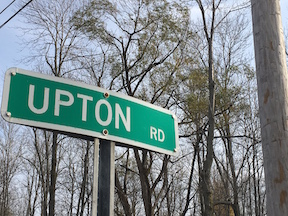 Upton Road runs straight as a railroad track away from Route 33 into the Genesee County countryside of western New York. The nearby town of Batavia—nestled roughly midway between Buffalo and Rochester—hails itself as “The Birthplace of Western New York” on the signs into town. But this particular ribbon of road looks Sleepy Hollow lonely, even by day. Autumn peaked here weeks ago, and the skeleton trees crowd the road, anticipating something that might bring them back to life.
Upton Road runs straight as a railroad track away from Route 33 into the Genesee County countryside of western New York. The nearby town of Batavia—nestled roughly midway between Buffalo and Rochester—hails itself as “The Birthplace of Western New York” on the signs into town. But this particular ribbon of road looks Sleepy Hollow lonely, even by day. Autumn peaked here weeks ago, and the skeleton trees crowd the road, anticipating something that might bring them back to life.
I’ve been invited to attend the dedication of a state historical marker marking the birthplace and family homestead of Maj. Gen. Emory Upton of Civil War fame. I know Upton best from his assault against the Confederate Mule Shoe at Spotsylvania on May 10, 1864. A colonel at the time, he was told to come back a successful brigadier general or not to come back at all.
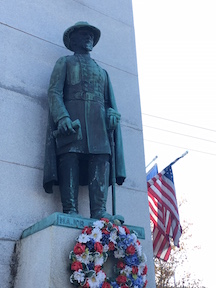
But I also know him for the desperate fight of his unit, the 121st New York, at the battle of Salem Church in May 1863. And its participation in the nighttime attack at Rappahannock Station in November of that same year. After earning his stars, Upton led a push at Spotsylvania against Myer’s Hill. And on and more through the Overland Campaign and onward, and after the war to a respected and influential career in the U.S. Army.
Perhaps it’s because I know Upton’s eventual fate—the death of his beloved wife of tuberculosis after only two years of marriage; severe migraines and depression; suicide at age 42—that another roadside catches my eye just before I reach my destination: Lear Drive. Always a note of the tragic with that Shakespearean name.
Fellow Emerging Civil War contributor Derek Maxfield, who teaches at nearby Genessee Community College, invited me here today—a day that could not have turned out more beautiful for the first of November. Temperatures rise like a friendly sun into the low 60s; in western New York, it could have just as easily been blizzarding.
Derek had been among the local experts who petitioned for the placement of the sign, which took about a year. A statue of Upton stands in downtown Batavia, and Upton is well known by local history buffs, yet Derek couldn’t believe Upton’s homestead had never been formally memorialized or marked. “It’s amazing this hasn’t happened yet,” he told me.
The Civil War Sesquicentennial finally provided the impetus to get things moving. Derek gives most of the credit to county historian Michael Eula.
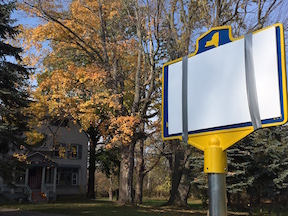
Derek and I gather with a crowd of about two-dozen people along the roadside across from the homestead, a charming gray farmhouse with Union-blue trim and pumpkins on the front steps. An American flag as tall as me hangs above them. A stand of maples, which have thus far retained their golden leaves, umbrellas the front yard. Joan and Bill Bird, the home’s owners, told me during a visit to the property last year that the maples have been there since Upton’s time. The trees and the Upton siblings grew up together.
“This is a great day for Genesee County,” said Ray Cianfrini, chair of the Genesee County Legislature, as he welcomed the assembled Upton admirers. He called Upton “one of our most famous Genesee County heroes.”
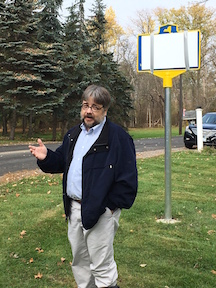
Derek spoke next and hailed Upton’s innovative legacy. “When dealing with the army, tradition-bound and full of West Point-educated officers who believe they understand all war has to offer—a young guy offering advice is a pretty brave thing to do,” he said. “When given an awesome opportunity, he took advantage of it and did it daringly.”
Don Burkel, a local historian who has studied Upton for decades, then offered a sympathetic biography of the general: The tenth of 12 kids in a Methodist family, Upton grew up to “live in two worlds . . . the disciplinarian and the compassionate man.”
I don’t question this interpretation aloud, but the Upton I know was quick to earn his commendations by throwing his men headlong into battle—hardly “compassionate” by any definition I know.
A soldier of high discipline, Upton also had his quirks. “He didn’t eat nuts when he was young,” Burkel said. “He slept on the floor without a pillow so that his body would remain erect.” Burkel also admired Upton for writing “thousands and thousands of letters.”
Beyond Upton’s contributions to army tactics, he championed the modern pension system and life insurance for veterans. He also laid the blueprint for a reorganized command structure of the army, including the creation of the Joint Chiefs of Staff. All the while, as duty allowed, Upton returned home for frequent visits. “He never forgot where he came from,” Burkel said.
Burkel added one final story—perhaps the most poignant of the day. Upton killed himself at the age of 42 while posted in San Francisco at the Presidio. “It was here, in this house,” Burkel said, gesturing over his shoulder, “that his sister Sarah got the letter with that news.”
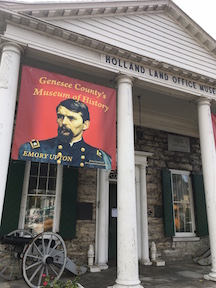
The final tribute of the day came from Michael Eula, who also served as emcee for the event. “This historical marker signifies two important points,” Eula said. “The first of these is the important place the Emory Upton occupies in the history of Genesee County. His life is embedded in the country’s history and in its understanding of itself.
“General Upton’s most visible traits—the primacy of religious values; his patriotism; his devotion to family and tradition—along with his courage—are all values deeply rooted in a county justifiably proud of its pioneering experience and commitment to the sanctity of individual liberty,” Eula explained.
The second point signified by the marker, he continued, is what Upton’s life means to America at large. Citing Upton’s “courageous stand as an abolitionist” and his efforts at Army reform, Eula said, “we are reminded that his success is, in part, his effort to improve American society by admitting to what is questionable in our society and hence, what should be challenged and changed.”
Eula’s remarks, succinct and thoughtful, strike just the perfect tone. I nearly get lost in thought as the ceremony shifts into “action” mode and local officials remove the covering from the face of the historic marker. The crowd applauds. Cameraphones snap. The local reporter—a former journalism student of mine, as it happens—rushes off to file her story.
It’s always a “win” when we gather to publicly remember our history, and this victory was especially heartwarming. The pride these folks felt for their hometown hero—a man who made important contributions in the struggle to preserve our country and major contributions to the evolution of the Army—was heartfelt. But just as poignant was their genuine appreciation for Eula’s efforts to make the marker a reality and their gratitude to the Birds for making their property available.
I made my way back up Upton Road, deeply grateful to Derek for inviting me to attend. On many levels, the event was an affirming reminder that individuals can, indeed, make all the difference.
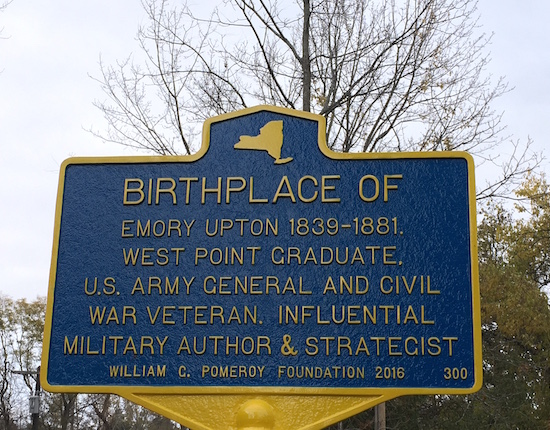
I enjoyed reading this uplifting article Chris.
Thanks, Don. It was a neat ceremony on a beautiful day.
This was a thoughtful article that elaborated on the positive. I can’t help but be reminded however that there is no escaping the tragic element in life. Upton’s suicide left a host of “might have beens”. Good work Chris.
Thanks. I couldn’t help but think of that tragic element, too.
Chris
I Truly planned on being there . My pard at the learning center Steve did say he saw you as we represented Echos Thru Time .Thank you for attending . please keep in touch we have a event you may be interested in at EMC
Tom